Page Spring Seminar 2023: 10 things you need to know about influence
The Page Society’s Spring Seminar was held this month in Brooklyn, New York. It is one of the most important events of the year for the global corporate communications community, and this year was filled with new ideas and speakers with unique perspectives on the latest trends and concerns in communications.
This was the first time Covid-19 was not the worry that it was in past years. In fact, the 2023 Seminar had one of the highest in-person attendance in the event’s history.
The title of the Seminar was “Influence at Work: New Rules to Reach and Persuade Those Who Matter Most.” With social media, AI and analytics surrounding everything we do, our sense of influence, persuasion, and power have been completely transformed. As communication professionals we must adapt to the new norms and discover how to harness these new tools. Page shared on their blog some of the new terms discussed during the Seminar, what they mean, and the context they were used in.
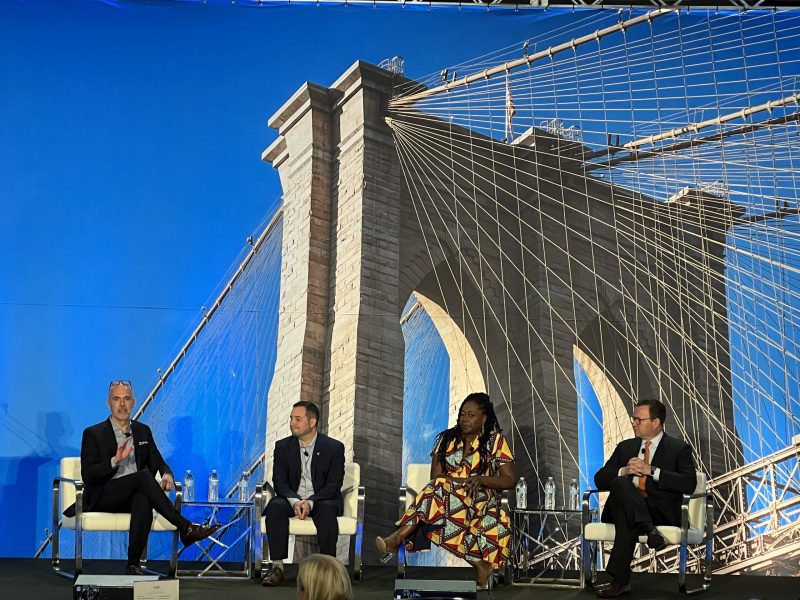
- Ethan McCarty, Chair of the Spring Seminar, on Influence
Ethan McCarty, CEO of Integral and Chair of the Spring Seminar began by pointing out that, “just because we’re in the influence business doesn’t mean we’re immune to it.” To be influential we must be open to the influence of others.
McCarty shared a survey of 1,200 employees his company Integral conducted with The Harris Poll. The survey asked “who has influence?” and “who should have influence?” The results showed the group most cited as having influence was employees with 47%, and 62% said employees should be more influential. McCarty notes that “the most important takeaway is that your employees are the leading voices in your network, and they want to be.” (Read the other five takeaways from Ethan McCarthy for Page Society’s blog here).
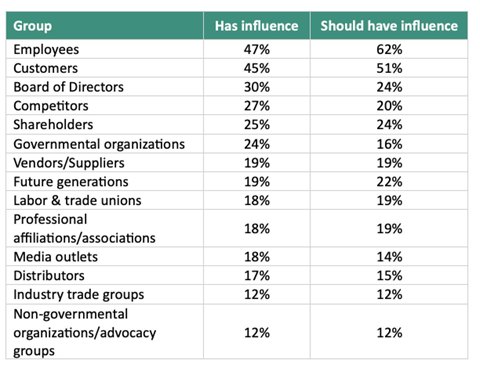
- The Value of Influence: A Conversation with Ezra Klein
In a conversation with Ethan McCarty, New York Times columnist and podcaster Ezra Klein talked about the value of Influence. They discussed the difference between influence and persuasion. Persuasion is an attempt to convince someone of your point of view, whereas influence is more about coming to an understanding and built on relationships over time.
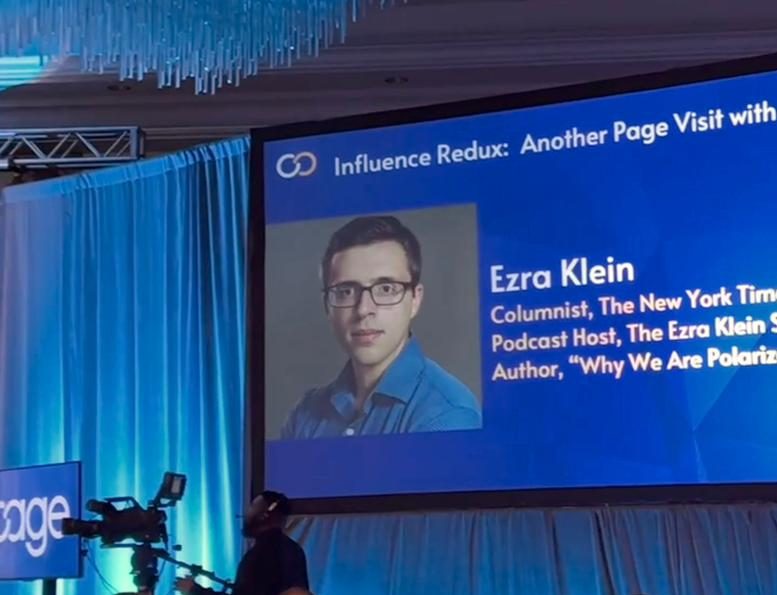
He also spoke about the limits of ChatGPT and other Large Language Models (LLM) in their present state and questioned the accuracy and value of the content they provide. Technologies like ChatGPT can be unreliable and Klein referred to Harry Frankfurt’s theory in his book On Bullshit. Frankfurt’s premise is that bullshit is speech intended to persuade without regard for truth. The liar cares about the truth and attempts to hide it; the bullshitter doesn’t care if what they say is true or false. Klein says that ChatGPT is providing an answer based on a statistical analysis of previous information and responses from the internet, whether it is true or not.
The social impact of AI on people’s lives was also discussed. Klein mentioned the movie “Her,” in which a man has a relationship with a virtual girlfriend created with AI. He feels these AI generated relationships are already with us and, for now, will have more impact on our lives than the economic impact of LLMs.
- Concerns about ChatGPT and AI
In another session focused on new technologies the conversation about ChatGPT and AI created a palpable angst amongst the audience.
Although these technologies are commonly referred to in economic terms – how they will affect productivity and change the way we do business –, the issue for many was: will it be a job killer? It spurred conversations during the two days as people feared they would lose their jobs.
The panel also focused on the problem of people with malicious intentions spreading lies and disinformation with the assistance of AI. It was suggested that the answer to this growing problem is to put guardrails in place, as Morgan Stanley is doing now.
- Navigating Influence in the C-Suite.
To contribute to the decision making process in an organization, communicators must build relationships and gain the respect and confidence of others, especially leaders.
CCOs are increasingly involved in the decision making process at the executive level. This requires translating data into tangible and coherent narratives that their C-Suite colleagues can understand, and also learning the mechanisms that can produce real results.
“At the executive level, you need to be a leader first – and an expert second.” Many CCOs are reluctant to speak up at critical moments for fear of being seen as overstepping their position within the C-Suite. Telling your boss what to do can seem perilous, but in fact, leaders rely on the opinion of others. The CCO’s well informed opinion can be crucial in making decisions at the highest levels.
- The Changing Landscape of Influence.
Brand image and reputation are no longer the exclusive domain of marketers and PR professionals. With social media dominating our view of the world, it is essential to engage external voices when determining how a brand is perceived.
Mark Schaefer of Schaefer Marketing Solutions, author of the book Marketing Rebellion: the most human company wins, explains that we are all in it together, “by shifting them [customers] from audience (ephemeral) to community members (evangelists), we connect with our stakeholders more deeply.” The audience must be included in the process and be provided with a narrative that they can connect with and contribute to. It’s important to make them feel they are part of the story and of a larger community and purpose.
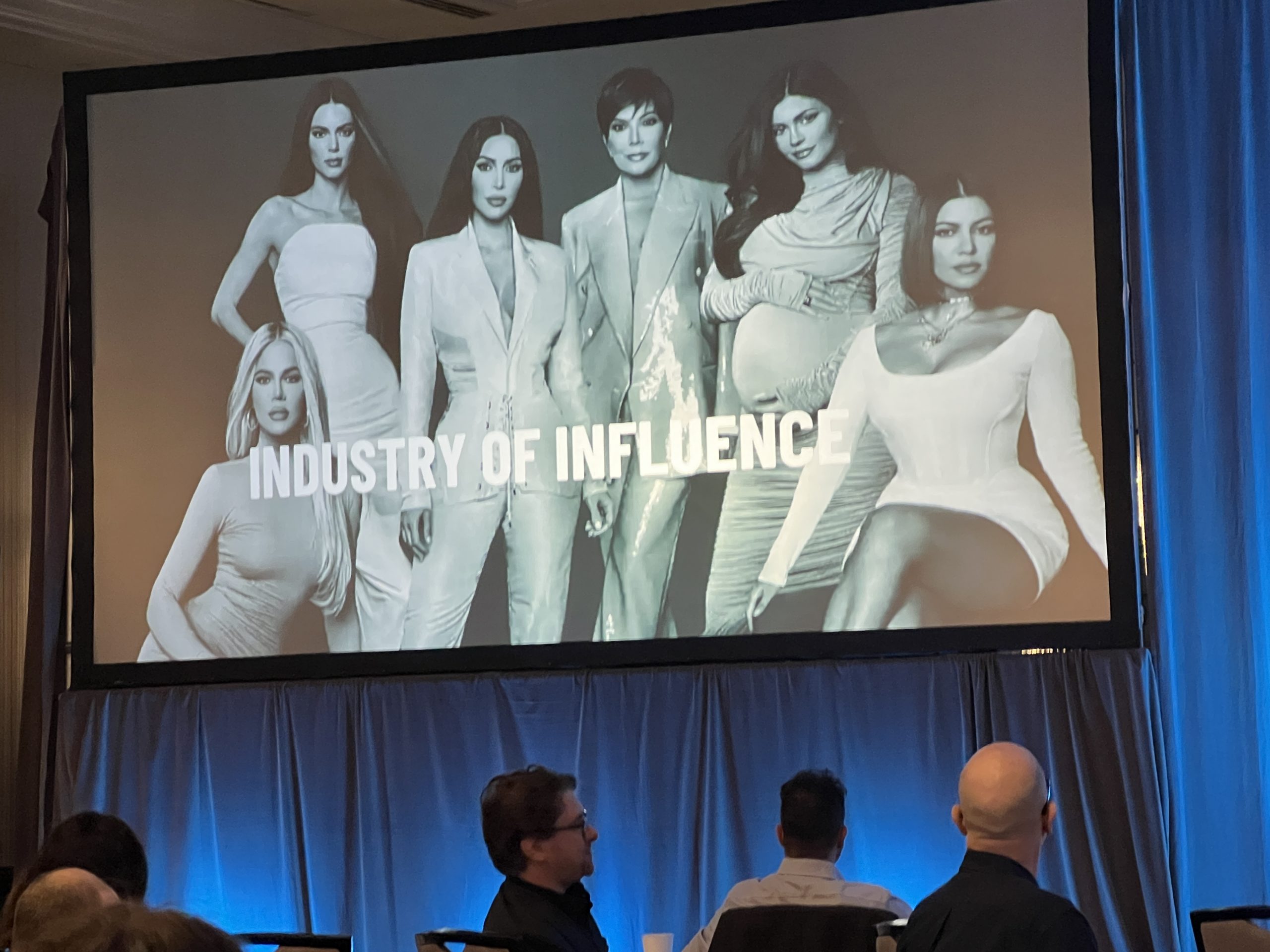
- The Destructive Influence of Disinformation
Disinformation has been with us for a long time. In the age of social media its power to influence can have a significant impact on an organization. Whether it be stakeholders spreading misinformation or the lies of conspiracy theorists, what is important is to understand who they are and what are their motives.
To counter them it is necessary to reframe the issue, not by disproving the information but by offering the correct information instead. There was also concern about apps like WhatsApp and Discord because they are encrypted and have very little content moderation.
- Influence and The Power of Understanding and Empathy
In one of the highlights of the conference the panel spoke about how understanding your audience is the key to reaching them.
- Emily Goodson, Writer, Speaker and Startup Advisor, began by talking about the need to understand yourself before you can understand and influence others. She has had to come to terms with her own disability before she could help guide others.
- Howard Pyle of Experience Futures, who is dyslexic, revealed that when you understand who your audience is you realize there is no “average internet user.”
- Jennah Blau, Publisher Education Manager at TikTok concluded by saying that it is important to spend time on the platforms your audience uses to truly understand what moves and influences them.
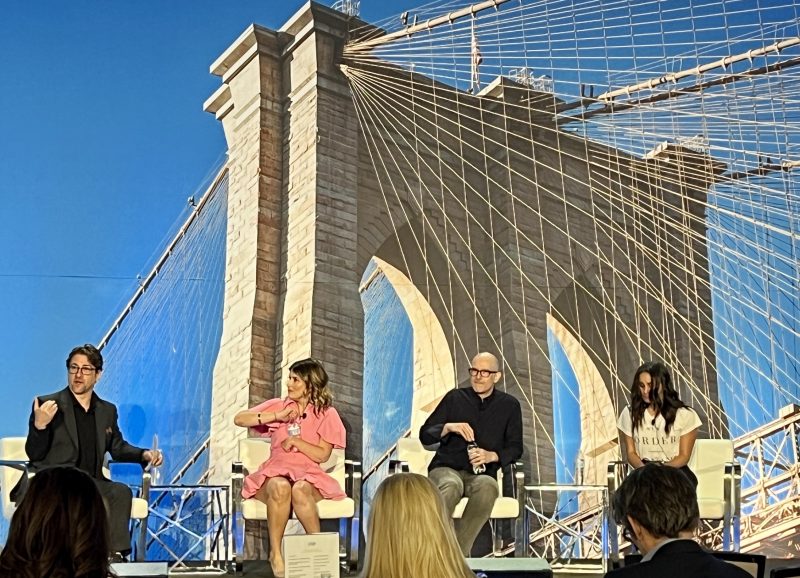
(Ethan McCarty, Emily Goodson, Howard Pyle, Jennah Blau)
- A Conversation with Chris Foster, CEO of Omicron
Foster, who is the CEO of Omicron, spoke about the concerns surrounding employees returning to the office. He pointed to the mistake that PR professionals often make – not understanding the particular client’s issues. He stressed that for communicators to gain value and influence it’s not enough to offer ideas, they must be able to solve problems. He also mentioned that it was important for him to improve his ability to understand and use Data.
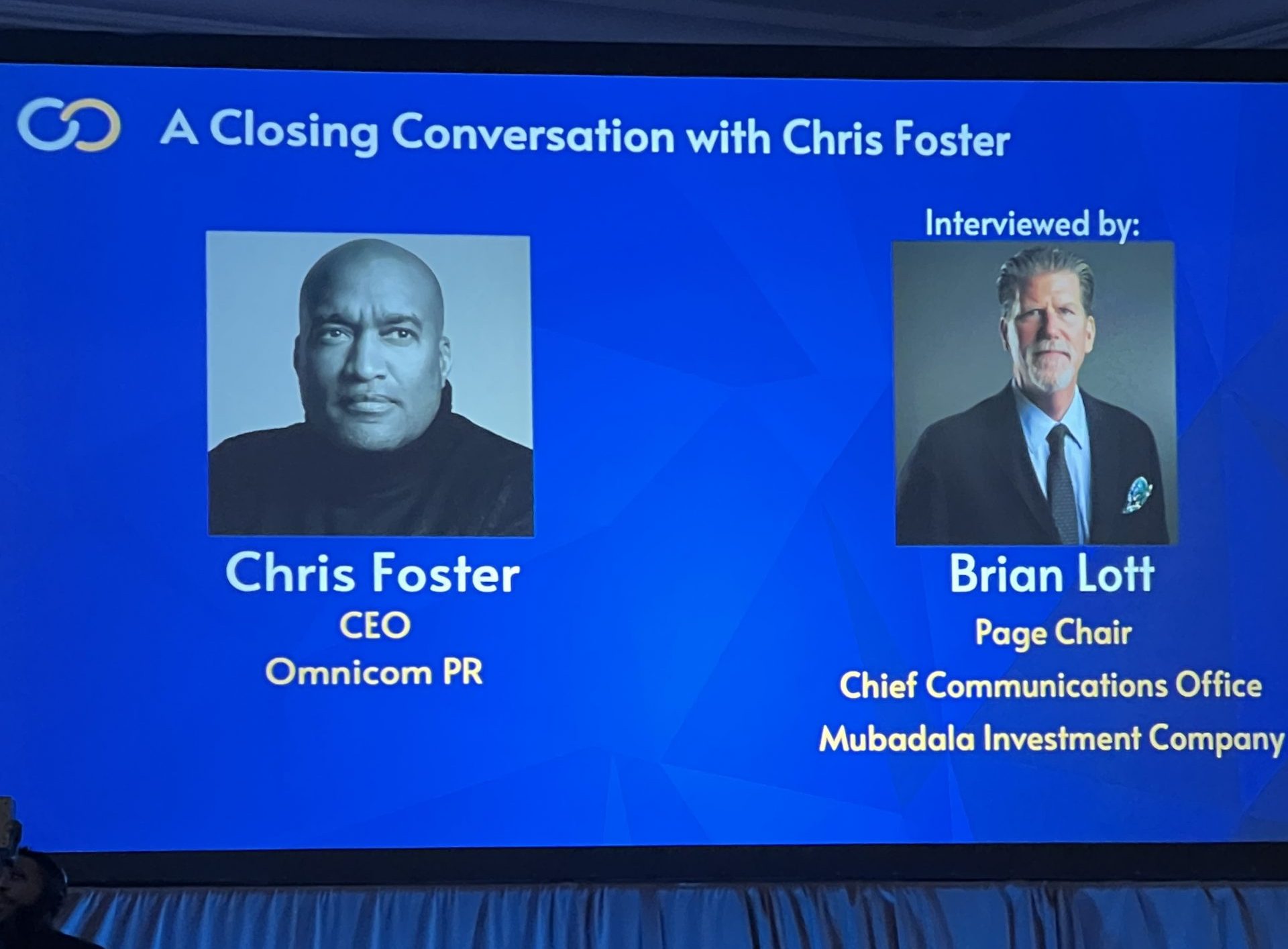
- Reflecting on the Seminar
The audience was asked to reflect on the two days and identify the issues that caught their attention the most. The issue of ChatGPT was certainly one that was uppermost in people’s minds.
Of particular interest and concern during the two days was the polarization of society which seems to be spreading everywhere, including the workplace. The use of AI to methodically spread disinformation has been a tool used to further divide communities and countries.
Another topic that caught people’s attention was the idea of “National Narcissism,” a term used to describe a country, in this case the United States, that is increasingly looking inward and not considering the rest of the world. For this reason, it was suggested, the soft power of the US media and entertainment may be diminishing and its influence around the world on the wane.
- The UnConference and Digital Canvas
The event managers wanted to create new ways of engaging the audience and encouraging them to contribute. During the seminar the audience was asked to comment and give their opinions about the conference and anything they wanted to add to it. They were not just passive listeners but active participants. It gave them the sense that they were a part of the community.
Another novel idea for the seminar was a digital canvas, which the audience could contribute to. Posted on a board, it included a visual timeline of different moments and key takeaways from the event.
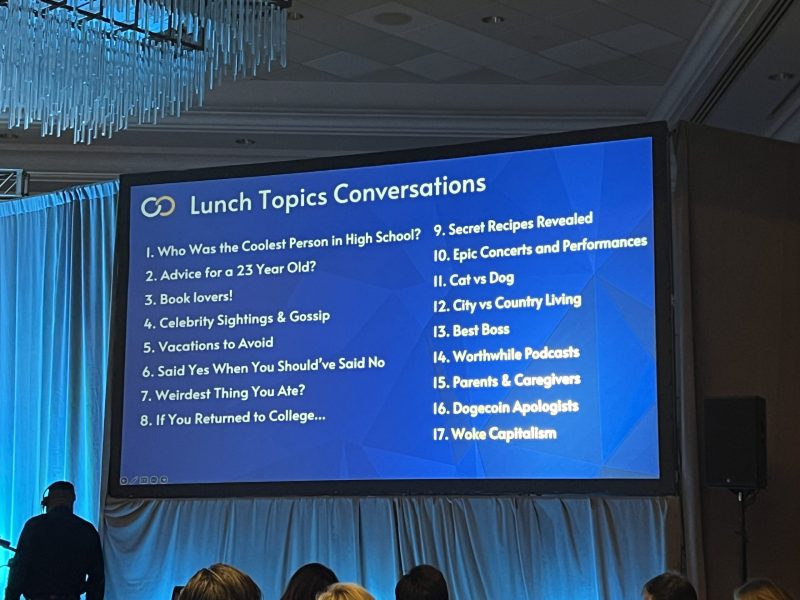
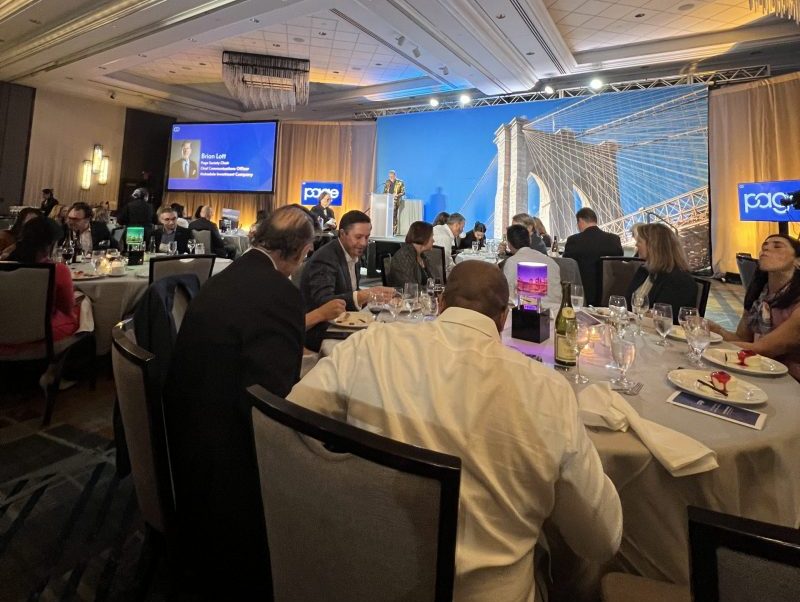
Destaques
- Global Alliance Launches Recognition Program for Young Communicators
- Alejandro Cornejo Montibeller Joins the Latin American Regional Council of the Global Alliance
- LiderCom Meeting Discusses International Expectations for COP30
- Sports as an instrument of Change
- Aberje Launches Newsletter with Economic Panorama
ARTIGOS E COLUNAS
Carlos Parente A comunicação precisa de um olhar menos vazioLeonardo Müller Bets no Brasil: uma compilação de dados e estimativasLeila Gasparindo A força da Comunicação Integrada: unindo Influenciadores e assessoria de imprensaAgnaldo Brito Diálogo Social e Comunicação Corporativa: A Construção do Valor na Era dos DadosHamilton dos Santos O esporte na mira da crise climática





























